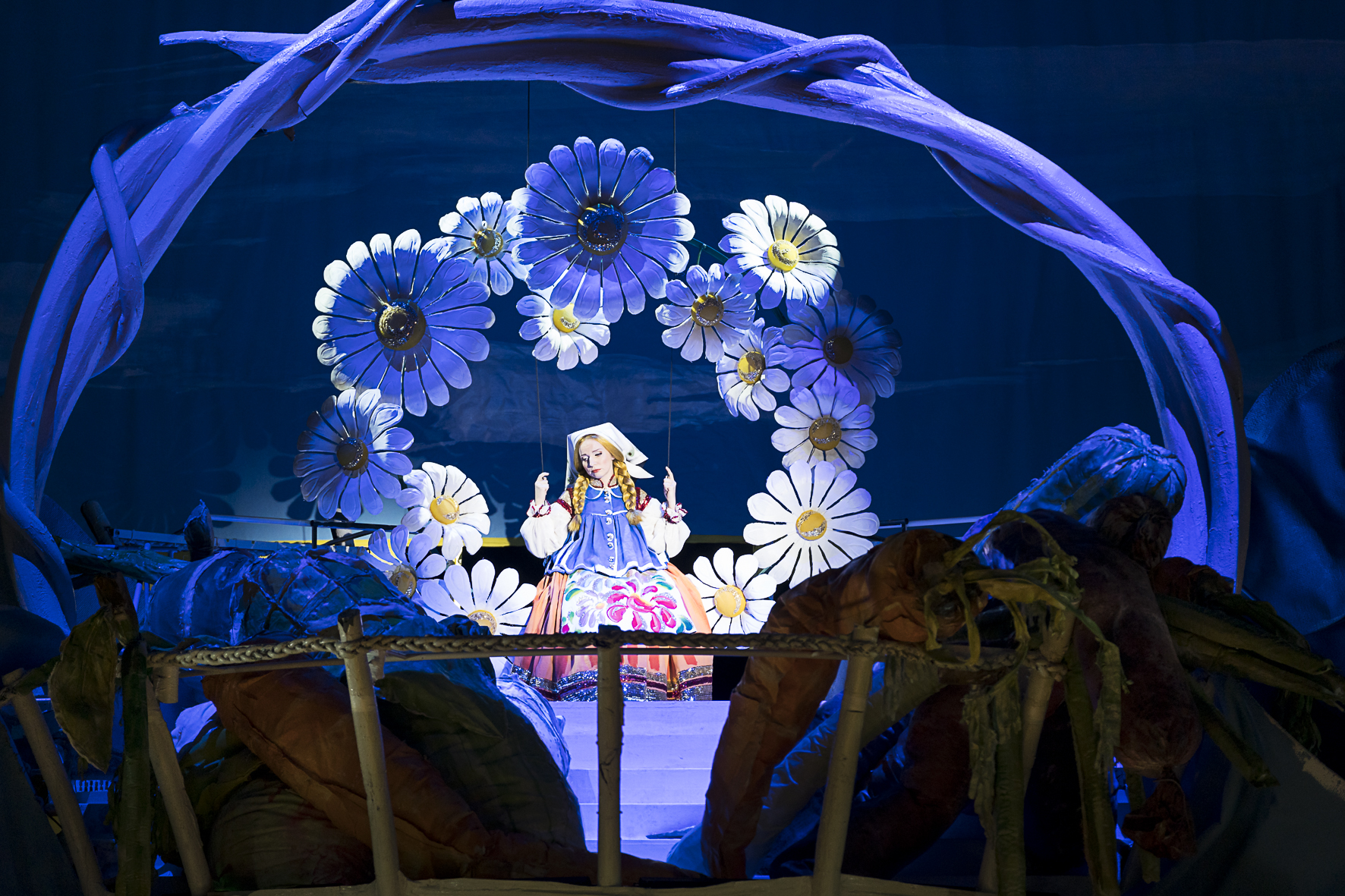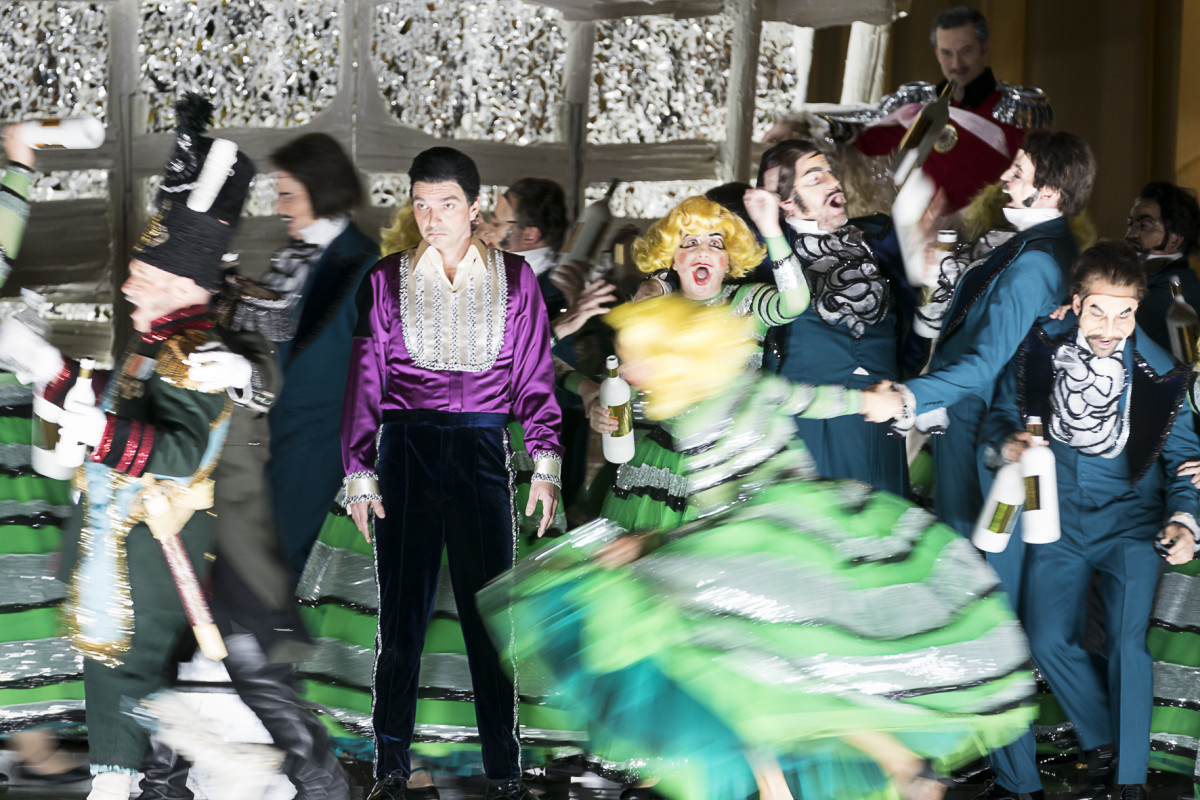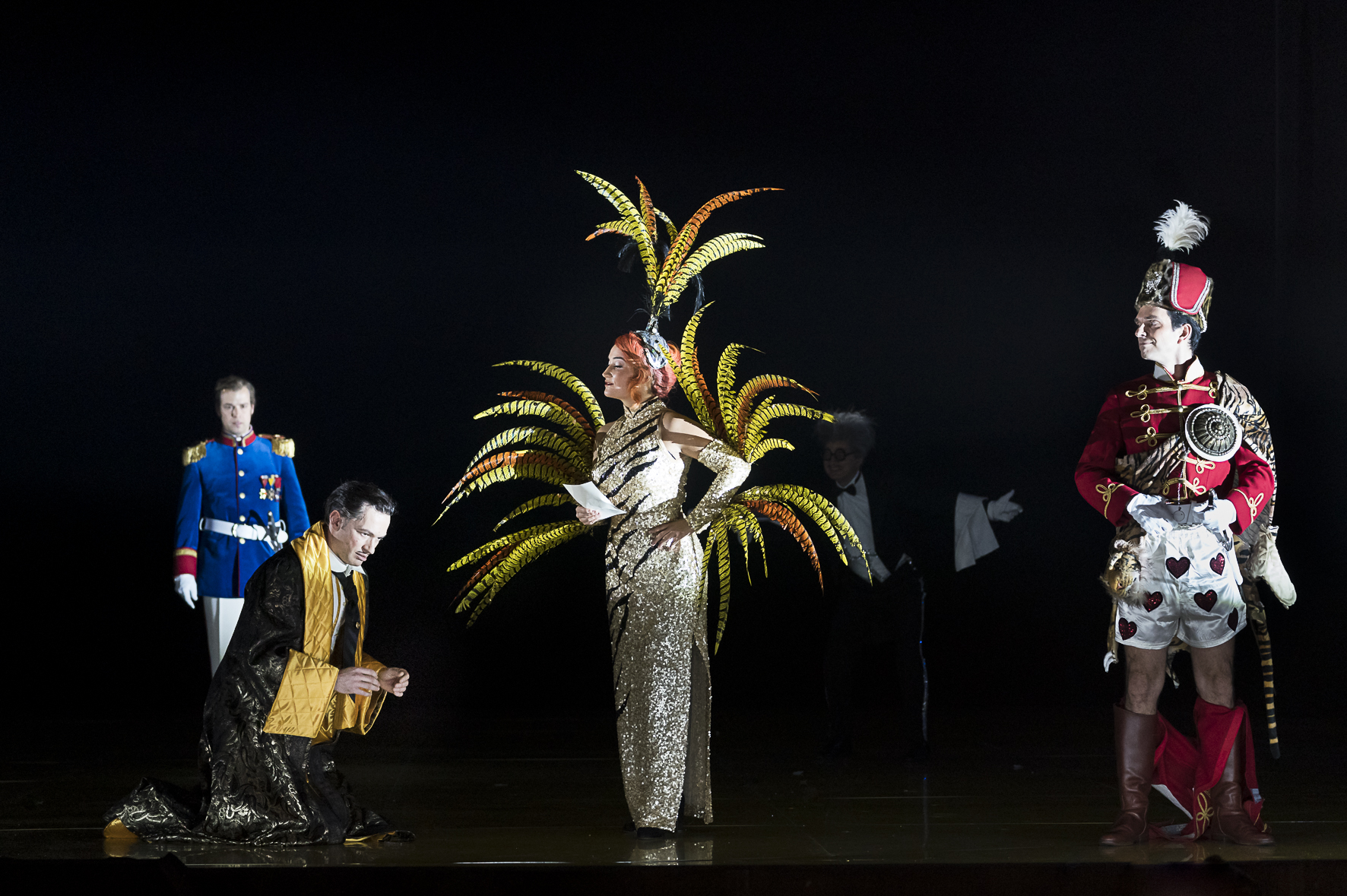John Groves
Operetta Research Center
5 March, 2019
Austrian-Jewish composer Joseph Beer’s operetta Polnische Hochzeit (‘Polish Wedding’) received its premiere in Zurich in 1937: it was quickly translated into eight languages and performed all over Europe until the start of WW2, since when it has languished in obscurity. Beer moved incognito to Nice, where he lived until his death in 1987, receiving awards for his musicological work. In 2012 the operetta was published and CPO issued its live recording soon after, revealing one of the most magical of all 20th century stage works.

Mareike Jankowski (Suza) and Ivan Oreščanin (Casimir von Kawietzky) in “Polnische Hochzeit” at Oper Graz (Photo: Werner Kmetitsch)
The plot concerns Boleslav and Jadja, childhood sweethearts reunited when Boleslav returns incognito to Russian-occupied Poland after rebel activities, around 1830. However Jadja’s father, Oginsky, has arranged a marriage for her with Boleslav’s uncle, the wealthy Staschek, previously married five times, and it is left to Suza, who runs Bodeslav’s estate and is known as ‘The Wildcat’, to sort things out.
In Graz’s superb (I have now used that word, so will try to avoid it again!) and deservedly highly popular production, Boleslav, the romantic tenor, is in the more than capable hands of Szaboles Brickner. Not only can he act and sing, the charisma between him and Jadja (Sieglinde Fieldhofer) is obvious. She has a delicious soprano, easily floating up to the high tessitura the role requires.

Mareike Jankowski (Suza), and the ballet of Oper Graz in “Polnische Hochzeit.” (Photo: Werner Kmetitsch)
Her father, Oginsky, is in the highly comical hands of diminutive Josef Forstner, who first appeared at the Volksoper in 1975. The director cast Andrea Purtie as Suza the wildcat, presumably because she is very tall and slender: her entrances always being accompanied by thunder!
Mathias Hausmann (Casimir in CPO’s recording) makes a fearsome Staschek in the first two acts, singing each line as if he is ‘ripping meat off a giant turkey’(Joanne Lessner), but then producing the silkiest, most velvety baritone imaginable for the final number of the operetta, and one of the most memorable finales to any stage work: a pseudo-romantic ballad in which he vows, having been married five times, to give up women completely and devote himself totally to… wine. He sings this whilst reclining on a giant spent match, the last glow of which is fading as he sings – total perfection.

Katharina Melnikova (Jadja) in “Polnische Hochzeit” at Oper Graz (Photo: Werner Kmetitsch)
The direction by Sebastian Ritschel is most imaginative. The prologue, at the Russian border, is represented by a huge piece of barbed wire slung across the stage. Beer is very cunning here, the mock serious opening music and underscoring trying to convince us that this is going to be a serious work!
The first act consists of a multi-level huge crown on a revolve, in bright blue and yellow(set designs by Martin Miotk) peopled by villagers in the guise of Russian dolls.
The impact is quite striking, even if the facial masks inhibit the volume of the chorus in this act!

Josef Forstner (Baron Mietek Oginsky), Ivan Oreščanin (Casimir von Kawietzky) at Oper Graz in “Polnische Hochzeit.” (Photo: Werner Kmetitsch)
This ‘crown’ is gradually dismantled during the course of the show to leave a bare stage by Act Three, where the yellow stage cloth is made to slowly withdraw upstage as if by magic.
Herr Ritschel has wisely decided to use Fritz Löhner-Beda and Alfred Grünwald’s original libretto, which proves to be very witty, especially as great attention has been paid to the dialogue which quickly moves the action on while linking fluently into the following musical number.
Choreography, often using Ballet Graz, is also inventive, especially when one considers that, apart from the most gorgeous waltzes, there are also Krakowiaks, Polonaises, a jazzy shuffle, a Charleston (‘Katzenaugen’) which has the sort of melody that, heard once, it is impossible to get out of one’s head, and a Marschlied (‘Eins, Zwei, Drei’), originally sung in praise of wine, but in this case in high praise of vodka (why are there so few songs celebrating vodka?)

Szabolcs Brickner (Graf Boleslav Zagorsky), Markus Butter (Graf Staschek Zagorsky), Mareike Jankowski (Suza), Ivan Oreščanin (Casimir von Kawietzky)
in “Polnische Hochzeit” at Oper Graz. (Photo: Werner Kmetitsch)
As I have already intimated, costume design, by Andy Besuch, is lavish. Most striking are those for Suza and Jadja, but no expense has also been spared on the various uniforms on display.
Those who possess the CPO recording will already know that the music is all from the ‘top drawer,’ combining elements of Kalman, Lehar, Abraham, Straus, yet at the same time being totally Beer!

CD cover “Polnische Hochzeit.” (cpo)
His orchestrations are light in texture, always allowing the voices to come through, and quite often unexpected. For example (and not included in CPO’s recording) the arrangement of ‘the’ wedding march for solo xylophone, clearly very tricky to play, in Act Two.
Unlike Kalman, he does not use reprises much, which is a shame as one longs to hear most of the numbers again! The orchestra, under conductor Marcus Merkel, played with obvious relish and very stylishly – one would never have guessed that they had been playing more Polish music the previous evening: Szymanowski’s King Roger!
Unfortunately the run of performances only continues until the end of March – surely it must be revived – and there were no spare seats or standing places at the performance I attended, so if you wish to see this marvelous operetta in a wonderfully imaginative production: you need to hurry!
By the way, if you have CPO’s recording, and despair of their unintelligible booklet notes, the Graz program, at 3 Euros, is well worth investing in, whether or not you are able to see their production. As well as interviews with Beer’s daughters, there are notes on the composer himself and on Polish weddings, besides copious photographs.
Why are you still reading this? Why haven’t you booked your ticket?
For more information, click here.

The costumes and sets look outstanding….. I wish operetta could always be framed like this. Simply glorious.
If you are interested in my review of the CPO-revording”:
https://basiaconfuoco.com/2017/01/16/joseph-beer-polnische-hochzeit-english-translation/
So why aren’t you going, Kevin?!
FANTASTIC review!! Thanks John Groves for a superb article!! And to Dr. Kevin Clarke for publishing it here!!